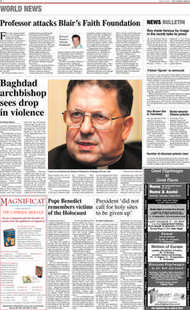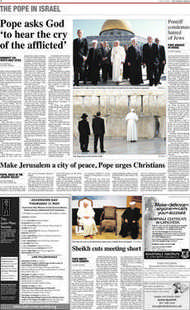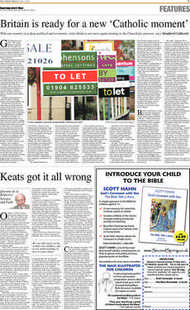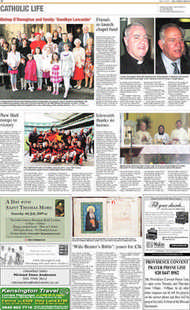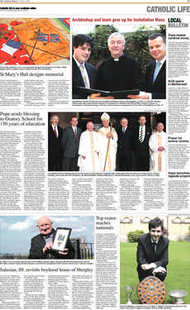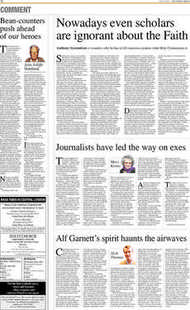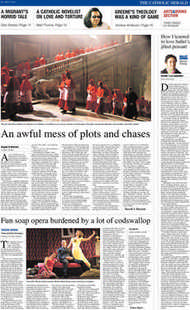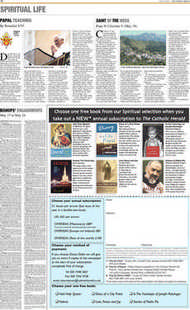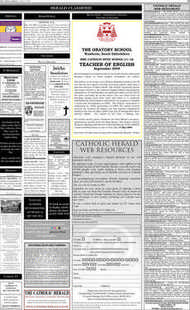Page 7, 15th May 2009
Page 7
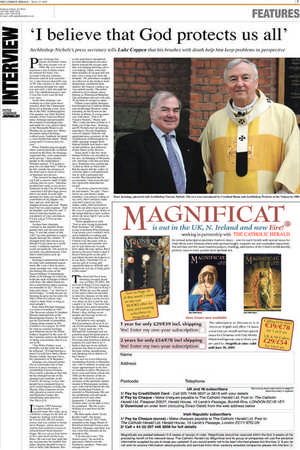
Report an error
Noticed an error on this page?If you've noticed an error in this article please click here to report it.
Tags
Share
Related articles
Saluting A Fearless Fighter For The Truth
Year In Review Part 1
2002 A Testing Year Sm 41 Caldwell And Luke Coppen Conclude
Cardinal Hume Was 'faithful To The Very End'
Archbishop Condemns `cancer' Of Sectarianism
‘I believe that God protects us all’
Archbishop Nichols’s press secretary tells Luke Coppen that his brushes with death help him keep problems in perspective
Peter Jennings has almost died three times. His first escape was in 1986. He was recovering from a trip to India when he noticed his body was covered with tiny nodules. Doctors said he had sarcoidosis, a rare disease that kills one in 50 who contract it. He could see nothing through his right eye and only a blur through his left. The ophthalmologist said it was the worst case he had ever seen.
At the time Jennings was working on a television documentary about the Charismatic Renewal in Europe event, Acts 86, at the NEC in Birmingham. The speaker was John Wimber, founder of the Vineyard Movement. Jennings had persuaded the hospital to discharge him, and made his way, almost blind, to the Metropole Hotel to ask Wimber for an interview. When the pastor agreed Jennings walked away. Suddenly he heard a voice behind him shout: “Peter, come back! I want to pray for you.” When Wimber prayed people often wept hysterically or flailed around on the floor. So Jennings suggested they went somewhere more private. “Jesus healed people in the marketplace,” Wimber replied. “I’m going to pray for you right here.” And so he did: outside the entrance of the hotel and in front of a bevy of bemused taxi drivers.
“The moment he began praying I felt a massive shaft of light coming into my eyes,” Jennings recalled last week as we sat in a Starbucks in the City of London. “And then I felt this huge power above my head. It went right through my body, my hands, the extremities of my fingers, my feet, and out. And then he stopped praying and said: ‘Right, that’ll be two and sixpence.’ And he laughed. And then he said: ‘I believe God has healed you completely of your sarcoidosis. I’ll see you at 5:30 to do the interview.’ ” An hour later Jennings watched as the nodules disappeared back into his arms and legs. “I was the colour of that wall,” he said, pointing to a grey façade through the window. “I changed from that colour to as though I’d just been on a world cruise. I suddenly realised I could see perfectly. The power in my body was phenomenal. I felt that I could almost pick up mountains.” Jennings examined the froth in his latte with undimmed amazement. He wore a blue tie and a smart pinstripe suit, with a lapel pin bearing the cross of the Sacred Military Constantinian Order of St George (in which he holds the rank of Knight of Merit with Star). He talked about his life at astonishing speed, pausing occasionally to say: “To cut a long story short...” or “Just put it into Google.” To help me get my bearings he gave me his entry for Who’s Who in Catholic Life, which is three times as long as most people’s.
Peter John Michael Jennings was born in London in 1947. The Newman scholar Fr Stephen Dessain baptised him at the Birmingham Oratory. At 10, he got his first break in journalism, writing about stamps in The Children’s Newspaper. In 1959 he went to a junior seminary near Melrose run by the White Fathers. Inspired by the story of the Ugandan martyrs he dreamed of being a missionary. But it was not to be.
“The White Fathers were probably not the order for me,” he reflected. “If I had become a priest I would have been a Benedictine, I think, because I love the spirituality of St Benedict.” Jennings sees himself primarily as a journalist, but is best known as press secretary to Archbishop Vincent Nichols. Over nearly a decade in that role he has emerged as one of the strongest personalities in the Church. So strong, in fact, that people have compared him to such varied figures as Zelig, the Woody Allen character invariably present at crucial events, and Malcolm Tucker, the intimidating spin-doctor in The Thick of It.
In August 1995 Jennings escaped death for the second time. He woke up in a holiday cottage on the Isle of Anglesey feeling worse than he’d ever felt. He fell unconscious and was rushed to hospital in Bangor, where doctors said he had suffered a massive subarachnoid brain haemorrhage. He was given four hours to live and received the Last Rites. He survived that night but lay unconscious for another fortnight. Doctors decided to move him to Selly Oak Hospital. But as the ambulance meandered towards Birmingham the anesthetist noticed the oxygen tank that was keeping Jennings alive was leaking. There were only three minutes of oxygen left and they were a long way from the hospital. The ambulance stopped on a flyover as the medical team desperately considered their options. By chance, a police car was parked nearby. The police offered to drive ahead, sirens blaring, to Warrington Hospital. The ambulance arrived with only 30 seconds of oxygen to spare.
Fifteen years earlier Jennings had bumped into Cardinal Hume and Archbishop Worlock while reporting on the Synod on the Family in Rome. A young priest was with them. “This is Fr Vincent Nichols,” Hume said. “He’s come out here to help us. I think you’ll like him.” Jennings and Fr Nichols met up later and launched a 30-year friendship over a Campari. After he was appointed press secretary of the Archdiocese of Birmingham in 2000, Jennings helped Archbishop Nichols turn back a tide of bad publicity that followed abuse claims in the diocese.
Since April 3, the day Archbishop Nichols was unveiled as the new Archbishop of Westminster, Jennings’s life has not been easy. Someone once said he has “a skin as thick as rhino hide”. But he clearly felt the volley of criticism after a well-publicised run-in with a journalist last month. He conceded that he occasionally “shot from the hip”, but vigorously defended his record.
“I’ve always tried to be truthful and honest,” he said. “That’s not to say one doesn’t make mistakes. I am always willing to say sorry. But I certainly make sure that I check my facts, unlike, sadly, other journalists who do not allow facts to get in the way of a good story. Some of the things that have been written about me since April 3 are in the realm of fiction.
“Some people have said: ‘You’re only trying to promote Peter Jennings.’ If I’d been trying to promote Peter Jennings I can assure you I wouldn’t have stuck faithfully to writing and broadcasting about the Catholic Church over the years with so many insults and untruths written or said about me. I could have taken the easy option. But I haven’t, because I believe that if Jesus Christ gives us the gifts and talents he does he expects us to use them. Therefore I try to use my gift of writing and communication as skilfully and effectively as I can to bring glory to His name.” The third and final time Jennings escaped death was on May 10 2002. He arrived at King’s Cross hoping to take the 12:45 train to King’s Lynn. When he saw the queue at the ticket office he decided to take his chances on the platform. The King’s Lynn service was about to leave and he just caught it in time. The train that he should have taken derailed at 100 mph as it passed through Potter’s Bar, killing seven people and leaving scores of walking wounded.
“I do believe very strongly that God protects all of us if we ask for his protection,” Jennings said. “I pray each day to St Michael the Archangel and my guardian angel for protection in my work. And I believe that, as Newman said, God has a definite purpose for each one of us. I believe that one of my definite purposes has been to serve him through writing, broadcasting and speaking out in defence of the Church.” For now he is not following Archbishop Nichols to Westminster, who is unlikely to make any major appointments in his first six months in office. He plans to have a rest and finish a book (his 18th) on the history of the air letter. He will serve as press secretary to the apostolic administrator of Birmingham archdiocese, who will be elected the day after Archbishop Nichols is installed at Westminster. He and the archbishop will still speak, email and text each other frequently. (“Archbishop Nichols usen’t to be able to text,” he explained. “But he is now brilliant at it and texts all the time.”) He then spoke about “Lead, Kindly Light”, the hymn Newman wrote in 1833 while stranded in the foggy Straits of Bonifacio between Corsica and Sardinia. Jennings said there was one verse that summed up his attitude to life.
“I do not ask to see / The distant scene,” he recited as pop music blared over the Starbucks speakers. “One step enough for me.”
blog comments powered by Disqus



